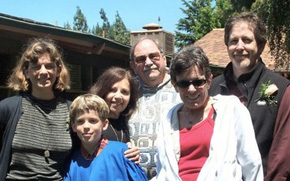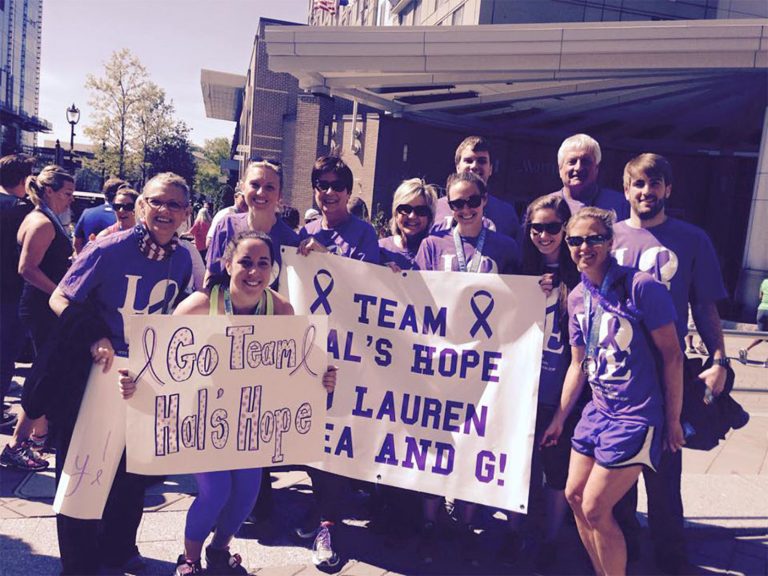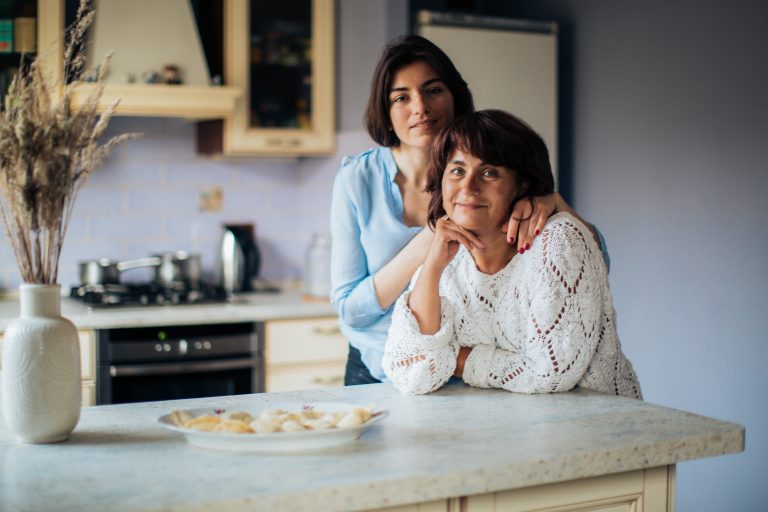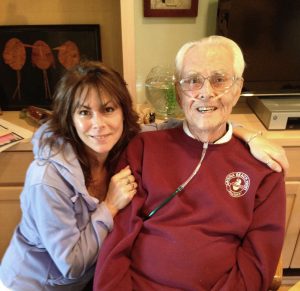Judith Hettler – December 2005
Vital Statistics
Judith Hettler was diagnosed with pancreatic adenocarcinoma in July 2001, at the age of 69. The tumor was 1.5 cm and found in the tail of the pancreas. She underwent the Whipple procedure a month later. Chemotherapy was 5FU. Surgery was performed at the Kaiser Permanente Santa Clara Medical Center; chemo and radiation at the Kaiser facility in Vallejo. Her surgeon was Dr. Ninad Dabadghav; her oncologist was Dr. Louis Fehrenbacher. Her daughter Lisa Hettler-Smith, one of her primary caregivers, also contributed to this story.
Background
Judith lives in Benicia, California, just north of San Francisco. She is retired from careers in drama education and telecommunications sales, and lives alone. Her grown children live elsewhere in northern California.
Medical Journey – Diagnosis
Judith had had neck surgery in November 2000. She made a full recovery, but never quite felt like herself – she was uncharacteristically weak, tired and had other mild symptoms. For months, nobody but her thought much about it, and her general practitioner wrote it off to heartburn. But by the following spring, a major pain occurrence moved her condition to the front burner. Blood work surfaced a liver abnormality, and an endoscopy and other tests led to the cold truth. As she was coming-to from the endoscopy, she became aware of the gastroenterologist saying to his nurse, “Do you want to tell her, or should I?” Thus forewarned, she waited as the doctor proceeded to confront her with the words
pancreatic cancer and
terminal. He declared surgery too traumatic at her age, but said chemo might give her a few more months. [“I went back to see him much later, all dressed up, just to show him I made it, and tell him what I thought of that. He asked “What
should I have said?” I said “Well,
something! You effectively took away all my hope.”]
A friend who had picked Judith up from the doctor’s office got her home and began contacting the family. Lisa, the oldest daughter, heard the news from her sister. “My sister can be a little dramatic, so although I heard ‘pancreatic cancer’, I didn’t know what a death sentence that normally is. I thought,
okay cancer … many people get cured of that.”
Lisa made other calls to various family. Then she went onto the Internet. Then she made the 60-mile drive to her mother. In the morning, Judith heard her crying. “Lisa never cries. She put her arms around me and said, ‘I can’t imagine life without you.’” Judith did not have access to the Internet, and nobody told her the details. But the doctor’s few words had been shock enough. “People started calling and coming. And we went looking for a new primary care doctor. That carried me along for a few days, before reality set in.”
Fortunately, that reality was soon replaced by a more optimistic one. The new primary care doctor, Dr. Joseph Robinow, told her he didn’t think they knew enough yet to be counting Judith out, and he ordered a CT scan. When he called with results, he said “you know what? There’s hope. I think you may be eligible for the surgery. The tumor’s not yet showing up on tests, and you’re not jaundiced. So it’s early. Let’s get you a surgeon and an MRI, and see what happens.”
Judith’s family wanted to be a part of the surgical decision, and started by calling some doctors they already knew. But since none of them were in related specialties, they weren’t much help. Lisa’s brother-in-law is head of emergency medicine at Johns Hopkins, in Baltimore. He echoed most experts in recommending that they find the surgeon who’s done the most Whipple procedures. Through colleagues, he was able to get them the name of such a physician in San Francisco. But because this surgeon was not in the Kaiser network, the costs would have been prohibitive. Finally they made their way to Dr, Ninad Dabadghav. He had trained under the San Francisco surgeon, and had 40 or 50 Whipples under his own belt. They liked that, and him.
Judith went through the self-questioning ritual that is common at this point, reviewing the bidding of possible causes. Her husband’s father and another non-blood relative had died from pancreatic cancer. Both Judith and they were smokers (in her case, “till the day before surgery!”). She also is of Ashkenazi Jewish heritage – that appears to offer a disproportionately high occurrence. But basically, it was what it was, causes or not.
Medical Journey – Treatment
Judith underwent the Whipple procedure at Kaiser Santa Clara in August of 2001. The elapsed time between diagnosis and surgery, while pretty normal, had Lisa nervous – she knew too much now, and was mindful of how quickly these particular tumors grow. On the big day, the waiting room vigil was a testimonial to the love that surrounded Judith, including all her children, a close friend, and even her ex-husband.
The surgery took the usual 9 or 10 hours, and went normally. Lisa also experienced the relief of all such waiting-room families when they were updated, a couple of hours into the surgery, that the Whipple would indeed be possible. “At that point, we knew that at least she had a chance.”
Judith’s post-surgery period was relatively uneventful. She was discharged in 10 days, and went to her daughter’s house for the first two weeks of recovery. She remembers eating almost nothing for several weeks. The aversion to food, as often happens, led to significant weight loss.
Her 6 months of 5FU chemo – one week on, one off – went from October through February, during the midst of which 6 weeks of radiation was added concurrently.
The Care Team
- Family – Judith’s three children responded to this in ways akin to roles they’d always played in the family. All were present for Judith according to their own personalities and circumstances. Lisa’s, however, enabled her be the more hands-on caregiver. And her no nonsense attitude really came in handy. “Lisa was always there, refusing to let me play victim. Having someone in my life like her – who has almost always dealt with life on life’s terms – was and still is one of my greatest blessings. She has also helped teach me to behave the same, which in turn has given me the gift of one day at a time. That and other platitudes I used to ignore or make fun of now seem so true. The present is a ‘present’, etc.”
- Friends – Friends are the family we choose for ourselves. Judith is a recovering alcoholic, and about 80% of her support group came from that very important “family”. After she returned home from Lisa’s house, the AA community closed in, took it from there, and never let up. “I would have died without them.”
- God – “It’s great to have the support and love of friends and family,” Judith says. “But the bottom line is that all you have is you, and a God of your choice, to enable you to turn inward and find the power to absorb these truths and to find your strengths.”
Attitudes
The biggest attitudinal plus came in the form of an AA mantra –
Let go, let God. Not giving up, but realizing you can’t control everything, and especially not the outcome.
“That first doctor gave me nothing to hang onto. But after the shock wore off, I simply said to myself,
I can’t die. I can’t not be here. There was a good PBS documentary once, about a woman with cancer. It was called
How can I Not be Among You? I just decided that it was not my time.”
“Hope – I appreciate the power that has for most people, but I personally don’t like the word much – to me it indicates no control, that you’re just giving yourself over and crossing your fingers. I believe you do have control, of your attitude if nothing else.” She prefers an alternate concept: tenacity in the face of adversity. We can’t control what happens to us. But we can control
what we do about what happens to us. As a volunteer, Judith is often given the names of cancer patients to counsel. She notices a direct correlation between attitude and survival. “Whenever people give up, they die.”
Father Tom, a friend, gave her this advice upon first hearing her dire news – “Breathe in and out, put one foot in front of the other, and go do something to help somebody else.” At first Judith thought,
Well, hmph! “But I soon realized he was right – his words come back to me often.”
Lisa tried to be careful not to alienate friends, especially as the siege wore on. “You don’t want your whole life to be about the cancer. If your conversation is always about ‘the disease’, friends feel they can’t share their issues, because yours is so much bigger. And really, you do want to talk about other things, because you’re sort of sick of it all too!”
Balancing fears can become a constant imperative. Judith went to the doctor recently for stomach pains. “You people!” she was told. “If you get a pain in your fingernail, you think it’s cancer.” One
can become rather a cancer hypochondriac, she says. In fact, during the period of this interview, she experienced some setback symptoms that did give her pause. A battery of tests, including of course some checking for the cancer return, came back clean, and immediately her symptoms began to disappear. A little sheepishly now, she says, “Cancer is a terrifying word. Especially this cancer. But when subsequent things happen, we need a little healthy spirituality, and to say to ourselves, hey,
I’m probably ok. Or at least,
hey, we’re all going to die sometime.”
Judith’s Most Important Resources
Dr. Bernie Siegel’s audiotapes and other resources. [
http://www.ecap-online.org/home.htm ]
The following websites: www.pancreatica.org and
www.pancreaticalliance.org.
The Association of Cancer Online Resources (ACOR) – a national, volunteer-led non-profit organization linking cancer patients and their families and caregivers with information, support and community. Their pancreatic cancer listserv group is one of the most active and supportive online. [Interested readers may join here:
http://www.acor.org/pancreas-onc.html]
Reflecting on your life – Before the surgery, mindful that a small number don’t survive the Whipple procedure, her son got out a video camera and got Judith talking. The unintended consequence was that it focused the whole family on their heritage and their collective memories. And mostly, it made her think. “I
did have a pretty good life, didn’t I?”
Planning your final memorial – During Judith’s post-hospital recovery weeks with Lisa, the two women and a neighbor sat down and designed her memorial service. “We picked the music, the people, the food – the works! We laughed. A lot. It was the best medicine. It’s a life event – after all, we plan all the others.”
Counselors – The hospital had a pre-surgery counselor – a volunteer who’d been trained in the medical
and other aspects of the Whipple procedure. She walked Judith through the surgery, things to say to the anesthesiologist, how to recover more quickly, etc. “That was a wonderful experience. It gave me a sense of some control.” [This program, complete with tapes, books and trained counselors, is used not only in the Kaiser system but in many other hospitals, and is also available to the general public. Kaiser’s particular link (there are many others) to these resources is:
http://www.permanente.net/kaiser/pdf/14639.pdf.] Another counselor at the radiation center later in her journey – an American Cancer Society-trained social worker – was helpful too, especially in encouraging Judith to express and explore her fears. .
The local chapter of the American Cancer Society was in fact a “huge resource in general” – offering transportation, counseling, and myriad other services at little or no charge. Its broad nationwide coverage also makes it an accessible resource practically everywhere.
A personal advocate – One of Judith’s friends and neighbors, Sally Woodard, is an especially strong and resourceful woman. Retired, she’s one of those people who
lives to solve people’s problems. She coordinated the friends’ care group for Judith, and got her connected to the ACOR listserv (above). She also arranged some meal deliveries, access to rides, and many other things Judith had no energy to pursue. Observes Lisa – “This shows it doesn’t always have to be ‘family’. In some cases, better that it isn’t. Family members have their own things they’re doing for the patient. Like Mom staying with me for two weeks – that’s something that a friend isn’t usually going to do. We do the heavy lifting, and it’s nice when others can do other things like those mentioned here. Give it away as much away as you can, to free yourselves for the emotional and direct physical support only you can provide.”
Advice
For patients:
- Be careful in selecting your doctors. It’s tempting to go for the rock stars, especially in such tricky surgery. But Judith found that in some cases, those doctors may not be as fully “present” during the surgery itself, legitimately stretched by training others or similar add-on responsibilities. Ask all the right questions, and decide what combination feels best for you.
- Learn how to receive rather than give. “Giving’s way easier,” says Judith. Once or twice, early in recovery, she found herself literally crawling across the living room floor to get a cup of tea. “I really don’t like to ask for help. But we need to get over that.”
- Admit your fears. Things you don’t share become part of the cancer inside.
For caregivers:
- Allow yourself the occasional less-than-noble feeling. Judith’s surgery came at exactly the same time as a long-planned hiking trip for Lisa and several friends. She alternated between feeling bad that she was missing the trip, and feeling guilty that she felt bad! Crises create disruptions in everyone’s lives, including caregivers – it’s ok to have those thoughts. More and more, people have many “families”, not just genetic ones – there are obligations to all, and all can be impacted when something goes wrong for one of them.
For friends:
- Lisa finds people are sometimes more reticent than they should be to reach out and offer support, both practical and emotional. “I felt that with my Mom, and again when my brother-in-law had a serious accident. When I finally asked my friends about it, they said they hadn’t wanted to bother me. Especially since I’m a strong person, they felt if I wanted support, I’d have asked. What I really needed was for people to call me and just even ask me how I was feeling – part of me thinks, I shouldn’t have to ask for things like that – but now I can see how it happens. So I’m more proactive myself now, about checking in with friends regularly when they’re in a bad time.”
- Outbound help – Volunteer (one of you) to be the switchboard/nightly news. Create an Email group with the addresses of anyone who wants to be kept informed, and then be the periodic updater on how the patient’s doing, thereby keeping individual inquiries from overloading the patient’s own Email or voicemail.
- Inbound help – Coordinate other friends and family. Collect in one place the list of people willing to be of assistance during and after treatment. Agree on the person in charge of finding out what’s needed when, and sending out the word so the patient doesn’t need to. (Groupware online calendars can even facilitate this, letting everyone sign up themselves for days or tasks they’re available to do. YahooGroups is one of many examples of a free way to implement both of these last two suggestions. [http://groups.yahoo.com/]
Last word
Judith, like many survivors, sees great gifts in the reality of her cancer. “It’s made me appreciate life, value my relationships, stop and smell the roses. It also forces the realization that most of the things I’ve obsessed about all my life are unimportant. It doesn’t mean I follow that every second. But I have the self-knowledge.” She identifies only one downside to this new attitude. “If someone I know complains about a seemingly lesser problem, it’s hard for me to resist telling them, ‘Oh, that is just
so nothing!‘”
There is a wonderful Native American saying. “Today is a good day to die, for all the things of my life are present.” Judith probably doesn’t think much of the first part of that right yet. But she is deeply appreciative of the second part. And of the second
chance.
As told to Alison Wiley, an oral historian working with people and organizations to recall and record their important stories.






